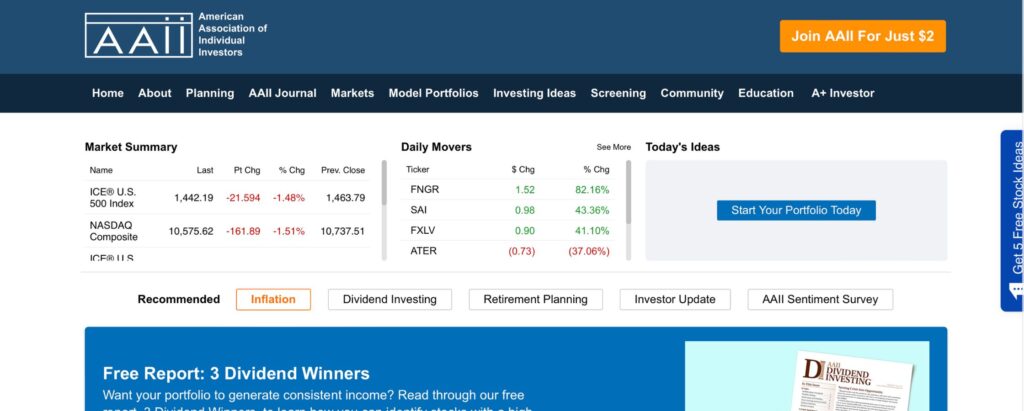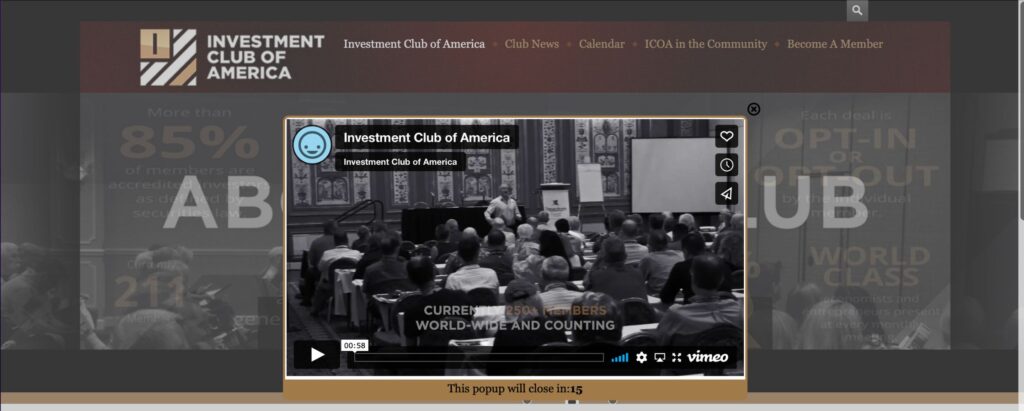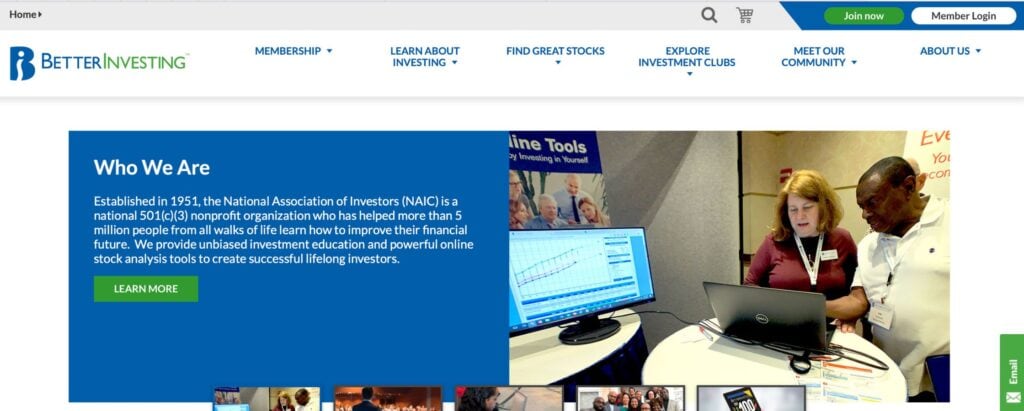Disclosure: This post may contain affiliate links. If you click on a link I may make a small commission at no extra cost to you. You can read the full disclosure here.
Last Updated on October 23, 2022 by Chris Panteli
Investment Clubs List
Do you want to be a successful investor? Perhaps you’ve studied financial markets, hedge funds, and the stock market for a while. You’ve subscribed to the Wall Street Journal, and now you’re ready to start making real money as a member of the investment community.
One downside to investing is that no matter how good your investment strategy is, there’s always some risk.
To become a more successful investor and reduce the risk, many investors join an investment club. Although investment clubs don’t guarantee success, joining an investment community packed with investment professionals will boost your chances.
If you’ve been looking at an investment club list, you may be wondering where to start. To give you some help, this post will explain investment clubs and give you some background on some of the most successful investment clubs in America.
What Are Investment Clubs
Investment clubs are for investors that want to join forces with other like-minded investment professionals. Some investment clubs may focus on specific investments like real estate investing, hedge funds, or startups. Other clubs may invest in diverse investments, including the stock market, crypto, and wine.
As an investment club member, you can invest in a wider range of investments with less risk.
Another reason to be part of an investment community is shared knowledge. You can share your knowledge with other club members and learn from them too. The more you know, the better the investment strategy you can build.
Best Investment Clubs List
Beginner investors can often benefit from joining an investment club. By sharing knowledge and risk, investors can make better decisions and make real money.
These best investment clubs list all operate in the US today. Whether you’re a seasoned investor, entrepreneur, or beginner investor, there’ll be a suitable investment club for you.
American Association of Individual Investors

The American Association of Individual Investors was founded in 1978 by Dr. James Cloonan. Some of the topics investors can learn about include financial planning, stock market portfolios, and retirement accounts. The American Association of Individual Investors aims to give investors all the knowledge they need to become successful asset managers.
Interestingly, this investment club is a non-profit organization.
Since its foundation, the American Association of Individual Investors has helped over 2 million members. Investors report that membership has resulted in them making higher gains than they otherwise would have.
Much of the content on the American Association of Individual Investors platform is free. That makes this investment club an excellent place to start for new investors. As you gain experience, you can upgrade to a paid membership that gives you access to premium content. The premium membership gives you benefits, including free investment courses, model portfolios, and techniques for screening stocks.
Fort Worth Real Estate Investment Club

The Fort Worth Real Estate Investment Club is based in Fort Worth, Texas. However, you don’t have to live there to become a member.
Anyone that wants to learn about real estate investing can become a member of this club. Weekly meetings are held online and in person for all members. At these meetings, real estate professionals teach you how to make real money from real estate and become a successful real estate investor.
Not only can you learn about real estate investment, but you can become part of a national network. Joining a network of real estate professionals is especially helpful if you’re a new real estate investor.
Investment Club of America

The Investment Club of America gives investors access to unrivaled investment opportunities. This is supported by the fact the club has made over $24 million in investments in just 6 years.
One reason the club is successful is thanks to the involvement of high-level members. Whether that be sharing knowledge with monthly lectures or taking an active role in investments, existing members of the Investment Club of America work hard to come up with the perfect investment opportunity continually.
Prospective members should know that becoming a full club member entitles them to many benefits. Some of the benefits of becoming an Investment Club of America club member are:
- Admittance to every club meeting
- Quarterly reports with guidance on how to manage your personal investment fund
- Entry to private events featuring special guests
The Investment Club of America is successful because many of its members actively participate in every investment idea. There’s no obligation to participate in any investment, and over 90% of club members are accredited by the securities definition of $1 million in net worth.
National Association Of Investors Corporation

The National Association of Investors Corporation (NAIC), also known as Better Investing, was founded in 1951. It’s a non-profit organization that aims to educate both individual investors and investment clubs.
Members of the NAIC can take advantage of a huge amount of free material. Some of the benefits of membership are:
- Learn about stock selection
- Access to the Better Investing community
- Guidance on creating your own investing community
- Mentorship
You’ll also receive regular educational material covering investment topics. These materials take many forms, including magazines, e-newsletters, and books. All the content you receive will be investment-related articles.
Contributors to these learning materials include investment experts, Certified Financial Planners, Chartered Financial Analysts, and other members of the investment community.
The Lafayette College Investing Club

Started in 1946 by Officer John Tarbell, the Lafayette College Investing Club is a student organization for any students attending Lafayette college. Officer Tarbell started this student organization with just $3,000, and today the student organization is the oldest student-run investment club in America.
The club reinvests a large chunk of the dividends to support education. Speakers, extracurricular activities, and annual field trips to Wall Street for club members are funded by the Lafayette College Investing Club.
A club meeting is held every Friday, with every member encouraged to attend, participate, and vote on decisions. Many topics could be covered at these meetings, such as:
- Discussions about buying or selling securities
- Upcoming events
- Guest speakers including expert investors and real estate professionals
The club’s portfolio is made up of a variety of securities. Its diverse investment fund has holdings in a mutual fund, stocks, and many other emerging markets around the world.
Tiger 21

Founded in 1999 by Michael W. Sonnenfeldt, Tiger 21 is an investment club for investors with high net worth. With an annual membership fee of $33,000, you’ll need to be an established investor to join this club.
Members of Tiger 21 could be high-net-worth entrepreneurs, executives, or an investor. All members must pass extensive background checks, including a credit check, before their acceptance.
Things To Consider When Joining An Investment Club
Financial markets can be confusing for new investors. Deciding what asset you want to invest in can be daunting. That’s why many investors consult an investment advisor before committing to an investment idea.
It doesn’t matter if you’re an investor in high school or a seasoned investor; you can benefit from joining an investment club. Here are a few things to consider when joining an investment club.
Join An Investment Club Association
Joining an investment club such as the National Association of Investors Corporation can be hugely beneficial. Existing club members benefit in lots of ways, such as:
- Professional development
- Access to upcoming events usually featuring talks by a seasoned investor
- Communal investment decisions to help reduce risk
- Education about financial markets including hedge funds, private equity, and real estate investing
Know Your Investment Style
Every existing club will already have an investment style. That means it’s important you know your own investment style first. Doing so means you can look for investment clubs that will be a good fit with your preferred investment strategy.
Investing style is based on many things, including your previous investment decisions, risk tolerance, asset allocation, investment time horizon, and much more.
Here are a few common investment styles that may apply to you.
Growth Investing
Growth investors usually look for an investment opportunity with the potential for high growth. Often this means investing in small companies with big potential. Emerging markets and technology stocks are popular investment ideas for growth investors.
Income Investing
Income investing is for investors looking to build a steady return. Normally, income investors will seek out an investment opportunity for stocks with high dividends.
Value Investing
Value investing involves finding undervalued companies and assets. A value investor will invest in these assets with the hope that they go back up to their true value in the future and they can make a big return.
Learn As Much As Possible
You could hire an investment advisor or join a mutual fund if you simply want to build your own investment fund. However, by joining an investment club, you will have the chance to learn continually.
A key benefit of investment clubs is the chance to learn and share with other members. You’ll enjoy faster professional development from talks by experts than you would by just reading the Wall Street Journal daily.
Plan For Long-Term Investing
An investment club is a great idea for long-term investing. If you plan to do short-term investing, you’re better off not joining an investment club. Instead, you could get help from an investment advisor.
Prospective members of any investment club will be informed of any penalties for early withdrawal. Holdings need to be long-term for an investment club to be successful.
The Pros And Cons of Joining An Investment Club
If you’re unsure about joining an investment club, it’s worth considering these pros and cons.
Pros
- Investment clubs reduce the risk of losses
- Club members are knowledgeable, and you can learn a lot about investing
- There are investment clubs for all types of assets if you want to diversify your holdings
- You can meet other investment professionals allowing you to be part of a strong network
Cons
- Investment clubs can be time-consuming; you’ll be expected to attend every club meeting possible
- Club members may leave the existing club if the market crashes
- You may need the approval of other club members on investment decisions
FAQs
What is venture capital?
Venture capital is a type of private equity financing. Startups and emerging companies often rely on venture capital firms to provide funding to get started.
I’m in college. Can I join an investment club?
Yes, many colleges have investment clubs. If you’re a budding entrepreneur, real estate investor, or want to learn more about investing, you can ask a faculty advisor about your college investment club.
Your faculty advisor should be able to inform you of upcoming events for prospective members. Attend as many as possible to decide if the club is right for you. At the very least, this will help with your professional development.
I’m in high school. Can I start investing?
Although there’s no minimum age to buy stocks, you can’t open a brokerage account until you’re 18. If you’re in high school, then you can start investing if a parent or guardian will handle the account for you.
You can also ask a faculty advisor for guidance if you’re unsure how to start.
What is the Investment Company Act?
The Investment Company Act was passed in 1940. Any companies involved in investing and trading securities are regulated by the Investment Company Act. That includes any that is a mutual fund.
Private equity companies are not regulated by this act as they cannot publicly offer their securities.







